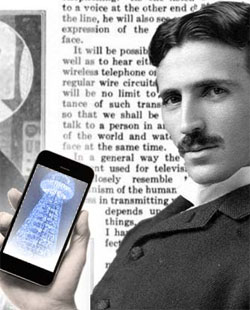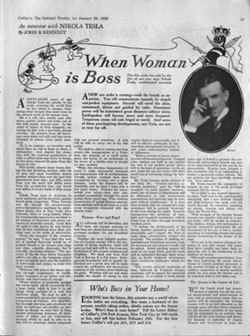In 1926 Nikola Tesla Predicted Smartphones
 Nikola Tesla was a man ahead of his time and his inventions gave birth to a number of technological advancement in the modern era. Aside from his many other creative and revolutionary ideas he also kind of predicted the existence of a device similar to today’s smartphones.
Nikola Tesla was a man ahead of his time and his inventions gave birth to a number of technological advancement in the modern era. Aside from his many other creative and revolutionary ideas he also kind of predicted the existence of a device similar to today’s smartphones.
This is what he said:
“…We shall be able to communicate with one another instantly, irrespective of distance. Not only this but through television and telephony we shall see and hear one another as perfectly as though we were face to face, despite intervening distances of thousands of miles; and the instruments through which we shall be able to do his will be amazingly simple compared with our present telephone…”
Tesla was a man of the future. Maybe not literally, but his mind was certainly much more ahead than the mind of his peers. His ideas were incredibly advanced for the early 1900. Can you believe than almost 100 years ago Nikola Tesla talked about a device which would have the same features as our modern smartphones?
He didn’t just explore electricity, he was making revolutionary breakthroughs in wireless radio communications, turbine engines, helicopters (Da Vinci should be credited for thinking first about this idea), fluorescent and neon lights, torpedoes and the X-ray, just to mention few. When he died, Tesla held about 700 global patents.
Nikola Tesla said: “There is a difference between progress and technology, progress benefits mankind. Technology does not necessarily do that.”
His forward thinking mind has inspired and amazed scholars and scientists for decades and will continue to puzzle them in the years to come.
This genius is one of the most important scientists in the history of our world yet somehow we can’t read about him in any history book. Why? How can it be that no history book mentions a man that had done so much for the advancement of mankind, for the advancement of technology and science in general?
These future generations that come deserve to know about the genius Nikola Tesla and all of his revolutionary inventions.
 If you doubt his advanced mind and all that’s said about him just take a look at this 1926 interview with Tesla for Collier’s magazine reproduced by Twenty-First Century Books. The interview is called When Woman Is Boss and it’s where Nikola Tesla talks about the development of the smartphone, a device which most of us are dependent upon.
If you doubt his advanced mind and all that’s said about him just take a look at this 1926 interview with Tesla for Collier’s magazine reproduced by Twenty-First Century Books. The interview is called When Woman Is Boss and it’s where Nikola Tesla talks about the development of the smartphone, a device which most of us are dependent upon.
“When wireless is perfectly applied the whole Earth will be converted into a huge brain, which in fact it is, all things being particles of a real and rhythmic whole.
We shall be able to communicate with one another instantly, irrespective of distance. Not only this, but through television and telephony we shall see and hear one another as perfectly as though we were face to face, despite intervening distances of thousands of miles; and the instruments through which we shall be able to do this will be amazingly simple compared with our present telephone. A man will be able to carry one in his vest pocket. We shall be able to witness and hear events – the inauguration of a President, the playing of a world series game, the havoc of an earthquake or the terror of a battle – just as though we were present.
When the wireless transmission of power is made commercial, transport and transmission will be revolutionized. Already motion pictures have been transmitted by wireless over a short distance. Later the distance will be illimitable, and by later I mean only a few years hence. Pictures are transmitted over wires – they were telegraphed successfully through the point system thirty years ago. When wireless transmission of power becomes general, these methods will be as crude as is the steam locomotive compared with the electric train.”
yogaesoteric
March 9, 2017
